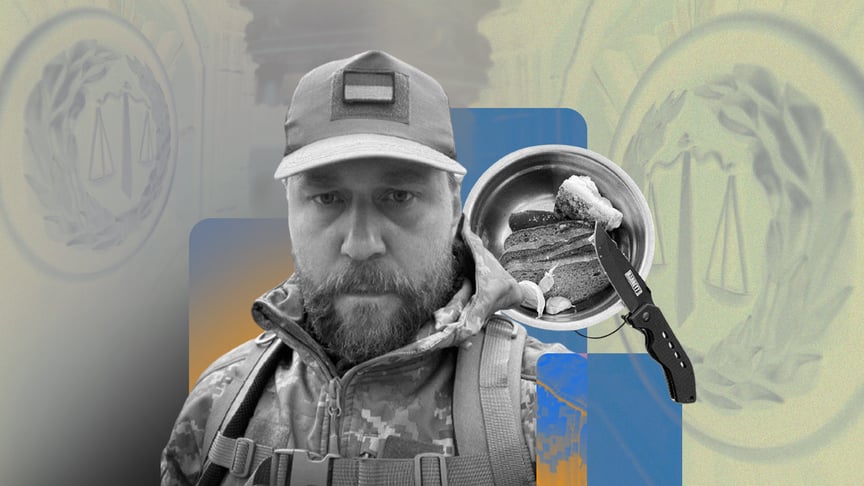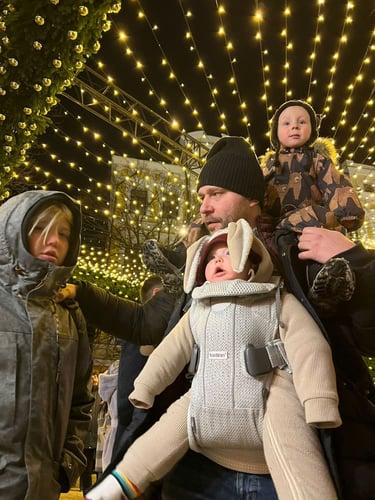Everyone is equal in the trenches: how a Supreme Court judge became a platoon commander

You are mistaken if you think that high-ranking officials do not volunteer for the front. Meet Ivan Mishchenko. Not only is he a judge of the Supreme Court, but he also heads the body that selects members of the High Qualification Commission of Judges of Ukraine.
In 2022, Ivan Serhiiovych, whom not every employee dared to speak to in the corridors of the Supreme Court, became one of the fellows in the trenches, where guys sometimes curse.
In the army, a graduate of the Institute of International Relations of the Kyiv National University, who knows the intricacies of protocol banquet etiquette, dines on a fishtail with a slice of black bread. Instead of a special fish fork (not to be confused with a snail fork!), he has a folding knife, and an aluminum bowl stands on an ammunition box.
When the soldiers learned about the civilian life of their platoon commander, they did not believe it at first. Over time, they took legal advice from the official, who worked with lawyers, diplomats, and statesmen of the European Union and the United States. And he ran around the field to catch a goat that was frightened by the shelling.
“Come back when you learn how to dig a trench”
His first attempt to join the army was unsuccessful. In 2014, when lawyer Ivan Mishchenko arrived at his district military registration and enlistment office to mobilize, the military officer took him out on the porch to smoke.
“Do you think you can dig a trench in half an hour?” the military officer asked.
Then the graduate of the military department, who had the rank of junior lieutenant and an accounting specialty as a military lawyer, answered: “I don't know”.
“Come back when you learn how to dig,” the military said.
“And then gradually the feeling that this is some kind of distant war, and we, residents of Kyiv, have nothing to do with it, took over. That it started without us and will end without us,” Ivan says.
He didn't practice digging trenches, but instead improved his professional skills. And at the age of 36, in 2017, he became a judge of the Supreme Court.
In February 2022, he felt that the war had come close to him: “It was obvious that there was a threat to the existence of the state as such. And that if the enemy succeeds, it will no longer matter who works in which court. Although I had not gained any practical military experience since 2014, I realized that I had to act.”
The longest month of his life
On February 24, he wrote on Facebook that the High Qualification Commission of Judges was suspending its work “due to obvious circumstances”. Then he took his three children, wife, and parents to Poland, and on the way back to Kyiv he brought humanitarian aid. Then he joined the army.
He had never learned to dig trenches in his 41 years, so he decided not to go to the military enlistment office. He made a roundabout maneuver and joined the Kyiany unit, which was created by a well-known Kyiv activist Roman Ratushnyi. They managed to get drones with the help of donations and began to engage in aerial reconnaissance.
The 72nd Brigade, which defended Kyiv in the spring of 2022, did not take the newly minted aerial reconnaissance men. The commander explained that his unit was more than adequately staffed, but allowed them to perform certain combat missions for the brigade. And when the Russians were driven back from the capital, the Kyiany unit asked to join the 93rd Brigade. Ivan, who had an officer's rank, was appointed commander of an infantry platoon.
It was still March 2022, and in terms of the concentration of events and emotions, this month was the longest in Ivan's life. There was only one professional military man in his company — the company commander. All the others were civilian volunteers. Many of his brothers-in-arms were older and in poorer physical condition.
“How did I get used to the war? I just got on with it. It's a very difficult and specific job, but it's a job that has to be done, and done well. That's all.
You rely on the people around you, and they rely on you. Those who have more experience teach you something. Then some situation happens, some fight, and your experience grows by itself. And so gradually you progress, and so do the people next to you.”
While Ivan was at war, Ukraine applied to the EU for the official status of a candidate country for accession to the European Union. One of the conditions for obtaining this status was the creation of a new High Qualification Commission of Judges. Ivan, who had been working on the creation of the HQCJ even before the full-scale invasion, was transferred to the General Staff so that he could continue his work on the HQCJ competition.
In the spring of 2023, the new HQCJ was finally created. So in May, Ivan demobilized as a father of three to work on adapting our judicial system to EU requirements.
A lawyer's and a commander's perspective
Today, Supreme Court Justice Ivan Mishchenko is optimizing Ukraine's legal system to adapt it to EU legal norms. When I ask him how the legal aspects of the Armed Forces should be optimized, Ivan answers instantly: it is necessary to eliminate the paper army.
“Shelling, especially at the frontline, is a normal story. But it becomes a disaster when military property is destroyed. Because healthy, intelligent men write papers instead of fighting. However, no paperwork and no photography will establish anything when a shell has destroyed everything. It is necessary to simplify and unify reporting so that the commander writes one piece of paper, not a bunch of them.”
As for the army, Ivan Mishchenko suggests taking into account expediency. In this context, we are talking about the already legalized mobilization of convicts.
“From my personal experience as a front-line soldier, I can say that convicts make bad soldiers. Alcohol, drugs, disobedience to orders. At some critical moment, this can negate the entire operation and cost the lives of fellow soldiers.
Maybe it's just my personal negative experience, but these people cannot be relied upon. They become a huge problem for the unit. I personally think it's a bad idea.”
Ivan went to the front as a volunteer, so he has an internal right to reflect on mobilization and exemption from it. In particular, on professional grounds.
"The question is not that everyone should be enlisted in the army, but where a person will bring the most benefit to the country during the war. Do we need to mobilize judges, prosecutors, police officers? They are part of the critical infrastructure. Therefore, the question of their mobilization is not about justice and equality of all in the face of the threat of destruction.
It is necessary to investigate crimes and punish criminals during the war. If the courts stop working, the state machine will very quickly stop moving. To the delight of Russians who dream that we will cease to exist as a state.”
Ivan is most annoyed when Ukrainians interpret mobilization as a punishment.
“For me, serving in the army is a matter of pride, and I will always be proud of it. I hope that my children will be proud of me when they grow up. To perceive mobilization as a punishment is to humiliate our army.”
It is an incredible happiness to live
War is when worlds mix, and people who had no chance of meeting in a peaceful life find themselves in the same trench.
“At the front, you cannot pretend to be someone. In the normal world, a person can have many masks and roles. But there is none of this there. There are real people there. They are who they are.
Everything that you acquired in civilian life loses its meaning — position, status, and other fuss. To be honest, no one there cared. At the front, there is some incredible closeness between people. Because it is war, because these are my brothers-in-arms, and I have to grit my teeth and fight.
Our position was adjacent to that of the 95th Brigade. They had a chief sergeant with the call sign Deputat. He was a big guy, it seemed impossible to kill him. A real warrior, the guys stretched themselves in a straight line in front of him. He was killed. I did not communicate with him much, but I still remember him. It's even hard to describe.”
Today, Ivan says he misses his brothers-in-arms and the degree of emotion that is impossible to experience in civilian life. He says that he has never seen such a beautiful sky as the one over the Kharkiv region in 2022, such beautiful stars as there. It was there that he experienced some incredible sense of beauty.
“If I'm being very personal, I felt a previously unknown happiness at the front that I was living. Right here and now. A bad day, a good day — it doesn't matter. You are living it. It is very cool. I also felt a deeper sense that I am a Ukrainian, that this is my land. Literally.”

Let's get rid of illusions
“My life before the front was a belief that there would always be peace. My parents' generation grew up and grew old without war, they lived with the illusion that war would never happen again. And their children, i.e. my generation, were brought up with this illusion. That's why we didn't believe in the possibility of war until the very end.
The front deprived me of this illusion. That's why my life after demobilization is not the same as before the front. War is a physical sensation. It has stayed with me. When I talk to foreigners now, I realize that they don't have it.
After the Second World War, Europeans lived with the belief that there would never be another war, which is why it was so difficult for them to adjust to the military reality. They need to realize that war can easily spread to Europe. They also need to get rid of the illusion of eternal peace.”
Having lost his illusions at the front, Ivan now realizes that his demobilization is not the end of the war. This story is still ongoing, and anything can happen, so he does not rule out the possibility of returning to the front. He quotes the words of his friend Roman Ratushny: “The more Russians we kill now, the less our children will have to kill.”
“We don't want to pass this story on to our children. We need to finish it all now,” he adds to Roman's thoughts.
- Share:
